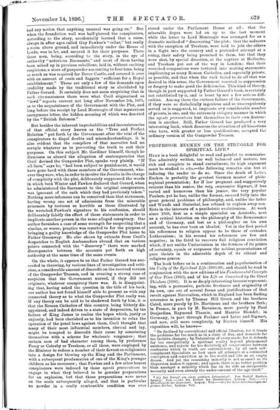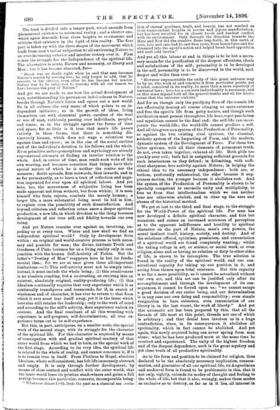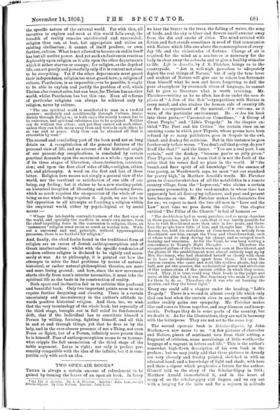PROFESSOR EUCKEN ON THE STRUGGLE FOR SPIRITUAL LIFE.* HERE is
a book delightful to read and painful to summarise Too admirably written, too well balanced and mature, too rich and complete to stand curtailment, its high argument mast be studied in situ,—the following remarks aim but at
inducing the reader to do so. Since the death of Lotze, Euoken is probably the greatest German master of philo-
sophical presentation; for if lest. pregnant and suggestively reticent than his senior, the very impressive Sigwart, if less varied and humorous than his junior, the very popular Paulsen, yet he has, unlike the former, entered fully into the great general problems of philosophy, and, unlike the latter and Wundt and Steinthal, has refused to explain away con- flicts in the interests of a pantheistic evolutionism. At work since 1868, first as a simple specialist on Aristotle, next as a critical historian on the philosophy of the Renaissance and of Germany, and last as a philosopher on his own account, he has ever been an idealist. Yet in the first period his references to religion appear to be those of orthodox Lutheranism ; in his second his references are few and negative ; in the third he recovers fall religious conviction which, if not unlike Unitarianism in the fewness of its points of certainty, equals or surpasses the noblest presentations of pure theists in the admirable depth of its ethical and religious genius.
The book before us is a continuation and popularisation of his Unity of the Spiritual Life (1885-88), and should be read in conjunction with the new editions of his Fundamental Concepts of Our Time (1893), and of his Life as Conceived by the Great Thinkers (1896). It is so deeply interesting because represent- ing, with a persuasive, pathetic freshness and originality of its own, one out of several forms and justifications of that revolt against Naturalism, which in England has been finding utterance in part by Thomas Hill Green and the brothers Caird, more purely by Dr. Martineau and the brothers Seth ; in France, in part by M. Ravaisson, more purely by Paul
Desjardine, Raymond Thamin, and Maurice Blonde]; in Germany, in part through Fechner and Lotze and Sigwart, and now, still more completely, by Eacken himself. His
exposition will, he knows-
" Be declined by conventional and official Idealism, for it treats the problems far too much as in a state of flux, and demands far too incisive changes ; by Naturalism of every shade, for it defends far too energetically a spiritual reality beyond phenomenal existence, and rejects far too decisively all compromises between contraries which in truth are contradictory ; by all such self- complacent Specialists as look upon all attempts at a connected conception and conviction as to the world and life as an empty dream. And yet the remaining minority is not as small as its dispersion makes it appear; and again, there is no better position than amongst a minority which has on its side an insuperable necessity and even already the under-current of the age itself."
• (1.) Der Kampf um einen aviation Lebenainhalt. Von Rudolf Enclien. Leipzig: Veit.—(2.) Die Einheit des Geistealebens. Leipzig: Veit...—(3
Grundbegriffe der Gegenwart. Leipzig: ) Lie Letiensanschauungen der grossen Denlier. Leipzig: Veit. The book is divided into a longer part, which ascends from phenomenal existence to noumenal reality ; and a shorter one, which again descends from these heights to re-examine and criticise that existence in the light of this reality. The first part is taken up with the three stages of the movement which leads from man's initial subjection to all-environing Nature to
an ever-increasing exterior and interior victory over it. First comes the struggle for the Independence of the spiritual life. The alternative is acute, Nature and necessity, or liberty and Man ; but it has become obscured, for-
" Bacon was no doubt right when he said that man becomes Nature's master by serving her ; he only forgot to add, that he remains in her service, even after he has become her master. Nature was to be subj,cted to reason; with all our reason we have become the prey of Nature."
And yet we are made to see how the actual development of man, notwithstanding his permanent indeLtedness to Nature, breaks through Nature's limits and opens out a new world. So in all cultnre, the very name of which points to an in- dependent initiative ; so in the growth of ideas, living themselves out with elemental power, careless of the weal or woe of man, ruthlessly passing over individuals, peoples, and times; so in the struggle against the forms of time and space, for so little is it true that man's life passes entirely in these forms, that there is something dis- tinctively human, which does not wage a relentless war against time and space ; so in the rise of the social entities and of the individual's devotion to his fellows and the whole. Even primitive anthropomorphism and mythology are already supernatural attempts at finding an interior relation to the whole. And, in course of time, man rends such webs of his own weaving, and becomes conscious that things have their special nature of which he is neither the centre nor the measure; doubt spreads, first outwards, then inwards, and in so far permanently, as to leave a trait of reflection and nega- tion imprinted for ever upon all spiritual labour. And yet here, too, the narrowness of subjective living has been made apparent not from without, but from within; it is man himself who feels, rejects, combats the merely human; a larger life, a more substantial being must lie hid in him, to explain even the possibility of such dissatisfaction. And beyond criticism and reflection arises anew a deeper spiritual production, a new life, in which devotion to the thing becomes development of our true self, and fidelity towards our own being.
And yet Nature remains ever against us, involving, im- peding us at every turn. Where and how shall we find an independent spiritual world ? Only by development from within ; an original and world-creative process is both neces- sary and possible for man; the divine, intrinsic Truth and Goodness of Plato becomes for us a living reality only in con- junction with the human Self-Activity of Fichte. But the latter's "Destiny of Man" reappears here in but its funda- mental idea ; for we are at once given three all-important limitations :—(1) This self-activity must not be simply intel- lectual, it must include the whole being ; (2) this creativeness is no absolute creating, but a co-creating, an entering into an existent, absolutely original, reality-producing life; (3) this Idealism continually requires that very experience which it as continually transfigures and transcends, for if, in search of wholeness and of character, it has ever to return to that from which it ever must tear itself away, yet it is the inner which here also still retains the leadership ; only to the work of mind and according to the self's activity, does experience unlock its content. And the final resultant of all this wrestling with experience is self-progress, self-determination; all true ex- perience turns out to be self-experience.
But this, in part, anticipates, on a smaller scale, the special work of the second stage, with its struggle for the character of the spiritual life. For this character is acquired by means of reoccupation with and gradual spiritual mastery of that outer world from which we had to turn, as the special work of the first stage. According to its very idea, the spiritual life is related to the whole of reality, and cannot renounce it, if it is to remain true in itself. From Plotinus to Hegel, absolute Idealism, where self-consistent, has left life immensely abstract and empty. It is only through further development, by means of close contact and conflict with the outer world, that the inner world loses its pristine shadowiness and gains a full reality, becomes this particular, concrete, incomparable being:
"Whatever shir.es f rth from the past as a classical ma: aesta- tion of eternal goodness, truth, and beauty, has not reached us from transcendant heights in serene and joyous manifestation, but has been wrestled for in closest touch and hardest conflict with its environment. Only through the direction towards the Here and Now did the creative flame leap forth, in this earth of ours, love and care had to cast firm roots, from hence force and fire streamed into the agent's action and helped break hard opposition and melt cold inertia."
And yet all this labour at and in things is to be but a neces- sary means for the purification of the deepest affections, ideals and satisfactions of the self; personality is to be developed in the self, personality is to be discovered in the world, each deeper and wider than ever :—
"However unpresen table the unity of this great universe may he by us, who work at and conceive it from particular points, yet it must, conceived in its reality, be more than a mere repertory of universal laws ; here too a concrete Individuality is necessary, and on this must depend both all the general truths and all the micro- cosms that the universe contains?'
And for us, though only the purifying fires of the cosmic life can effectually destroy all coarse clinging to mere existence and free the spirit's life from petty nature, and though such purification must persist throughout life here,—yet pantheism and mysticism cannot be the final end: the self-life can incor- porate the world-life ; the world-life cannot produce a self. And all this gives us a system of the Production of Personality, as against the two existing rival systems, the classical, aesthetic system of the Imparting of Form, and the modern, dynamic system of the Development of Force. For these two latter systems, with all their elements of permanent truth, do not, even taken together, exhaust all life. Both glide too quickly over evil ; both fail in assigning sufficient grounds for such interiorness as they defend; in delimiting, with suffi- cient sharpness, free activity against Nature; in helping the ethical idea to its necessary independence : both are, at bottom, profoundly unhistorical, the elder because it sup- presses motion, the younger because it abolishes rest. And
the system of the Production of Personality is shown to be specially competent to reconcile unity and multiplicity, to free us from that intellectualism which we can neither bear nor otherwise abolish, and to clear up the uses and abuses of the historical method.
We get at last to the third and final stage, to the struggle for the World-Power of the spiritual life. For man has now developed a definite spiritual character, and this but occasions and causes an increased acuteness of perception as to the apparent indifference and hostility to spiritual character on the part of Nature, man's own powers, the moral instinct itself, history, society, and destiny. And of the solutions offered, optimism, pessimism, and renunciation
of a spiritual world are found completely wanting ; whilst the taking refuge in art, or science, or social work, or even religion, alone and as having no relation or duty to other sides of life, is shown to be incomplete. The true solution is found in the reality of the spiritual world, and our con- stitutional capacity for taking up our position in it, and acting from thence upon total existence. But this capacity is so far a mere possibility, as it cannot be actualised without our own act, and this act can be justified only after its accomplishment and through the development of its con- sequences, it cannot be forced upon us; "we cannot escape a great decision of our entire being, and our determination is in any case our own doing and responsibility ; even simple resignation to bare existence, even renunciation of our liberty is, in the last resort, the work of liberty." And yet this axiomatic act has been prepared by this, that all the threads of life meet at this point, threads not one of which is arbitrary ; and that denial here involves us in a huge contradiction, since, in its consequences, it abolishes all spirituality, which in fact cannot be abolished. And yet again, this newly acquired being can never spring from man alone; what he has here produced must at the same time be received and experienced. The unity of the highest freedom and of the deepest dependence, such is the great mystery and yet clear truth of all productive spirituality.
As to the form and position to be claimed for religion, thus declared to be the absolutely necessary implication, consum- mation, and guarantee of all our spiritual life, its Augustinian and medimval form is found to be problematic in this, that it not only, rightly, extends its modes of thought and feeling to the whole of life, but that it also, wrongly, makes these modes so exclusive as to destroy, as far as in it lies, all interest in the specific nature of the external world. For with this, all incentive to explore and work at this world falls away, the breadth of reality remains uncultivated and unrevealed ; religion thus can, at best, but appropriate and utilise an existing civilisation ; it cannot of itself produce, or even further, culture. What is not allowed to become an end in itself has lost all motive power. And yet such exclusiveness reacts as deplorably upon religion as it acts upon the other departments which it either starves or cramps ; for religion, as the depth of life, can act purely and powerfully only if it is content not alone to be everything. Yet if the other departments must guard their independence, religion too must guard hers ; a religion of culture, Pantheism, is as impossible ;—to be possible, it ought to be able to explain and justify the problem of evil, which
Theism also cannot solve, but can bear, for Theism has another world, whilst Pantheism has but this one. Even all reforms of particular religions can always be achieved only by
religion, never by culture.
"The one spiritual world is manifested to man in a twofold manner : mediately and conditionally through Culture, imme- diately through Religion; in both cases the merely human has to be overcome, and spiritual substance has to be acquired. Neither can do without the other; and yet they cannot aid each other, unless they can both move away from and towards each other, be at war and at peace. Only thus can be attained all that is attainable by man."
The second and concluding part of the book need not so long detain us. A recapitulation of the general features of the personal view of life, and an account of the historical origin of our present-day complications, is concluded by certain practical demands upon the movement as a whole ; upon each of its three stages of liberation, chara3terisation, interiora- don ; and upon the four chief sides of life,—religion, ethics, art, and philosophy. A word on the first and last of these latter. Religion here means not simply a general view of the world, nor the resultant or satisfaction of one side of our
being, say feeling ; but it claims to be a new starting-point, an historical irruption of liberating and transforming forces, which as much requires the co-operation of the whole of our being as our whole being requires it. Again, we are here in full opposition to all attempts at founding a religion within the empirical world, either by psychological or by social means :— " Where the intolerable contradictoriness of the first view of the world, and specially the conflicts in man's own nature, form the chief impelling force in the conversion to religion, there, an ' immanent ' religion must mean as much as wooden iron. With- out a universal and real principle, without hyperempirical processes, there is no foothold for religion."
And, finally, the chief faults found in the traditional form of religion are an excess of Jewish anthropomorphism and of Greek intellectualism ; whilst with the specific tendencies of modern culture religion is declared to be rightly and neces- sarily at war. As to philosophy, it is pointed out how the attempts to solve the final problems by means of natural- historical, or rather natural-philosophical theories, are more and more losing ground; and how, since the new movement starts chiefly from man's interior necessities, it must take the spiritual life as the basis in its construction of reality.
Both space and inclination fail us to criticise this profound and beautiful book. Only two important points seem to us to require further deepening and clearing. There is a certain uncertainty and inconsistency in the author's attitude to- wards positive historical religion. And then, too, we wish that the very terminology of the whole book, but especially of the third stage, brought out in full relief its fundamental drift, that if the Individual has to constitute himself a Person by willing, forming, fighting himself, and all this in and at and through things, yet that he does so by the help, and in the ever-clearer presence of not a Thing, not even Force or Spirit, but of a Person, infinitely more person than
he is himself. Fear of anthropomorphism seems to us to some- what cripple the full enunciation of the third stage of the noble argument. Lotze is right ; not only is perfect per- sonality compatible with the idea of the infinite, but it is com- patible only with such an idea.








































 Previous page
Previous page